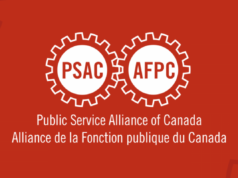The following letter in response to CBSA’s communication on arming was sent to CBSA’s Vice-President on April 22, 2014 by PSAC’s Legal Counsel, Collective Bargaining BranchLa réponse suivante au document de l’ASFC sur l’initiative d’armement a été envoyée à la vice-présidente de l’ASFC le 22 avril 2014 par la conseillère juridique, Direction de la négociation collective, de l’AFPC:
We write in response to the Canada Border Services Agency’s (CBSA) recent correspondence titled “Use of Force Training for Frontline Employees” and the associated communiqués and questions and answers which were distributed to all employees on April 10, 2014.
It is our view that CBSA is misrepresenting what was agreed to in the new Border Services Collective Agreement with respect to the process for Duty Firearm Course (DFC) participant selection and with respect to its statement as it being clearly defined as an integral component of the condition of employment to carry, use and maintain CBSA-issued defensive equipment.
In the Questions and Answers document, CBSA has stated that: “As per the FB Collective Agreement, if you were hired in the FB group after August 31, 2007 and refuse to participate in training or are not successful in obtaining any of its pre-requisite components, this may result in the termination of your employment for not meeting the conditions of employment of your position.”
It also states: “As per the FB Collective Agreement, if you were hired into the FB group prior to August 31, 2007 you have the following options to consider: […] if you are eligible, retire on or before March 31, 2016. […] If retirement is not an option, begin proactively searching for a position that does not have as a condition of employment that you to carry (sic), use and maintain CBSA-issued defensive equipment […]”
The other option listed states: “You have until the date you are scheduled to attend the Use of Force Training program, and its prerequisites to consider these options. If you do not want to attend the Use of Force Training Program and have not found an alternate position, or if you have been deemed not successful in the Use of Force Training program, at that time, you will be placed on leave without pay for up to two-years and registered in CBSA Internal Placement Process for referral to vacant equivalent positions that do not require the condition to carry, use and maintain CBSA-issued defensive equipment, as well as lower level positions at the CBSA. After one-year, if you have not been successfully placed within the CBSA, you will be concurrently registered in the Public Service Commission’s Priority System for referral to vacant or equivalent or lower level positions in Public Service wide”.
As you are well aware, the Collective agreement does not state this. The Collective agreement specifically states: If the employee fails to meet the criteria for firearm training and certification, the Employer will make every reasonable effort to find them a placement opportunity within the Public Service for employees hired prior to August 31, 2007, if the employee is trainable and mobile.
CBSA’s Questions and Answers document also states that: “the FB collective agreement provides a training schedule for achieving successful results on March 31, 2016”. There is no such training schedule contained in the Collective agreement. Specifically, the Collective agreement states: The parties agree to maintain a joint consultation committee to discuss the strategy for the selection of firearm training participants. These committees have not yet met as the Collective agreement was just recently signed. Regardless of this, CBSA has decided to proceed on its own with this strategy.
CBSA adopted an accommodation policy in 2011. The 2011 policy applies to CBSA Officers who may require accommodation due to failing CDT training, including sidearms. Your recent communications with employees describe a process that contravenes this policy. To our knowledge, this policy is still in force.
Furthermore, it has come to our attention that CBSA management is informing our members that any previous agreements regarding accommodation are now null and void. CBSA is propagating this information in its statement in the questions and answers document. A reading of all distributed documentation seems to suggest that CBSA is completely disregarding its obligations under human rights law and does not recognize its obligation to accommodate employees up to the point of undue hardship.
We understand that CBSA officers working at airports have been told that they must undergo psychological assessments. The CBSA has made a policy decision not to arm all CBSA officers working in international airports. As such, it is not reasonably necessary for all of these officers to have to submit to an intrusive violation of their personal privacy, in order to fulfill their job duties. We wish to advise that we will challenge this invasive action with recourse that will include seeking punitive damages for this high handed and arbitrary harassment of our members.
We ask that CBSA immediately cease and desist intimidating its employees and using the DFC training as a pressure tactic to get employees to resign. We are extremely shocked and disturbed at the communications being issued by the CBSA and we ask that CBSA immediately take down and rescind the communications that were issued to our members within the next 48 hours, failing which we will exercise our rights to the full extent of the law.




